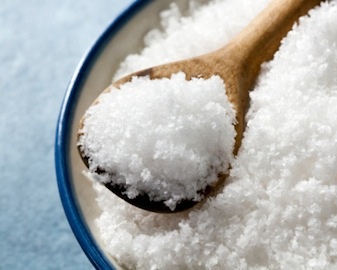Tags
bloating from too much salt, bloating from too much sodium, salt, sodium, tips to reduce bloating
Have you ever had a really delicious meal out at a restaurant and then the next morning you feel bloated and uncomfortable. No matter how well you normally eat, it is easy to over do it with sodium and not even realize it until the next day because you feel dehydrated and bloated. Here are some tips to help you get over this feeling a little quicker.
- Drink plenty of water. Water will help to flush out the system, consuming to much salt can cause dehydration, which will cause the body to retain water making you feel bloated.
- Avoid soft drinks and sport drinks.
- Cut back on salt intake; do not add extra salt to food.
- Consume foods rich in potassium to help balance sodium levels in the body. Food that are high in potassium are spinach, white beans, baked potatoes with the skin on, mushrooms, salmon, acorn squash, plain low-fat yogurt dried apricots, raisins and bananas.
- Avoid processed foods and try to mostly consume fresh whole foods.
- Try to consume foods that are natural diuretics to encourage the elimination of sodium and water. Foods that are natural diuretics are cabbage, celery, garlic, onions, green beans, pumpkin, eggplant, asparagus, cranberry juice, pineapple, watermelon and grapes.
- Elevate your legs to reduce bloating in legs and ankles. Raise your legs above your head for 30 minutes, 3 to 4 times a day.
- Exercise, it will get your metabolism moving.
- Cut down on simple carbohydrates like bread and pasta because they will increase water retention.
- Eat foods rich in vitamin B-6, B-5, D and calcium because vitamin B-6 is a natural diuretic, vitamin B-5 and D aids in digestion and calcium decreases bloating.
- Foods High in Vitamin B-6: brown rice, dried chili powder, fish, meat, chickpeas, lentils, pistachios, sunflower seeds, garlic, broccoli, asparagus, bell peppers and spinach.
- Foods high in Vitamin B-5: brown rice, sunflower seeds, mushrooms, avocado, fish, sun-dried tomatoes and cheese.
- Foods high in Vitamin D: fish, soy milk, tofu, milk, yogurt cheese, eggs, mushrooms and orange juice.
- Foods high in Calcium: soy milk, tofu, soy beans, sardines, salmon, white beans, cheese, milk, yogurt, dried herds, oatmeal, almonds, flax seeds, sunflower seeds, spinach, kale, broccoli, and oranges.
The recommended daily intake of sodium is no more than 2,300 milligrams recommended in the Dietary Guidelines for Americans in 2010. That equals about one teaspoon a day, so it is easy to over do it. So next time the sodium bloat gets you, just follow these simple tips and you will be feeling like yourself in no time.
♥ ♥



